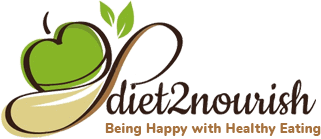Cancer Nutritionist Dietician in Delhi
4000+
Happy Clients
300+
Diet items
14000+
Kgs. Weight Loss
20+
Countries
Cancer transforms life in several aspects. It impacts your body, your heart, and your vitality. Such treatments as chemotherapy, radiation, and surgery might be difficult. They can make you feel sleepy, gain or lose weight, and lose your appetite. However, the right diet can change a lot.
If you are looking for a cancer nutritionist in Delhi, Diet2Nourish can assist you in eating in a manner that favours your health along this journey. Together with a nephrology dietician in Delhi, Dt. Priyanka Jaiswal, you will be able to deal with side effects, maintain your strength, and recover quickly. Proper eating will make your life better in the course of fighting cancer and even afterwards.
Choose us and have a healthy and balanced lifestyle
Emphasise managing treatment side effects, improving quality of life, and supporting recovery through specialised nutrition.
Supporting Your Body Through Cancer
The Power of Nutrition
Food is not merely a fuel, but a potent resource during cancer care. The proper diet assists your body in coping with the stress of treatment and sickness. It maintains your energy level and prevents weakening of the immune system. Hence, it is good to consult a cancer nutritionist in Delhi.
Impact of Cancer & Treatment
Cancer and its treatment can cause:
- Fatigue: extreme tiredness, although after rest.
- Weight alterations: Sudden weight loss or gain.
- Weakened immunity- Gets infections more easily.
- Intestinal Disorder: Nausea or diarrhoea, or constipation.
- Delayed healing- Tissues and scars require increased time to heal.
Knowing these effects helps a dietary consultant create a plan that works with your needs.
Why Nutrition Matters
In cancer, each bite matters. Proper food can:
- Stay energetic to perform your day-to-day activities with support from an iron rich diet chart for strength and recovery.
- Boost your immune system to help against infections.
- Minimise side effects of treatment such as nausea or mouth sores.
- Enhance mood and mental status.
- Assist your body to recover more rapidly following a surgery or a treatment.
An expert nutritional therapist will be able to manage your diet in a way that enables it to support and be palatable to consume.
Compassionate & Expert Care
Dt. Priyanka Jaiswal's Approach to Cancer Nutrition
Dt. Priyanka Jaiswal is an experienced cancer nutritionist in Delhi. In addition, she is also a dietician for kidney patients in Delhi helps to remove toxins from the body. She provides both professional and caring care. Being the best renal dietician in Delhi with 12+ years of experience, we hold a proven track record. We approached it by:
- Knowing the kind of cancer and the stage of treatment.
- Testing your present nutrition and health requirements.
- Select those foods that you like and feel you can digest without too much difficulty.
- Just making easy adjustments to what fits in your life.
- Taking you through the whole process, from diagnosis to recovery.
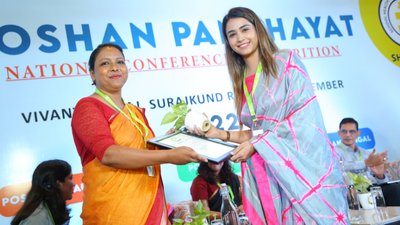
Our 3-Step Cancer Nutrition Support Program in Delhi for Comprehensive Care
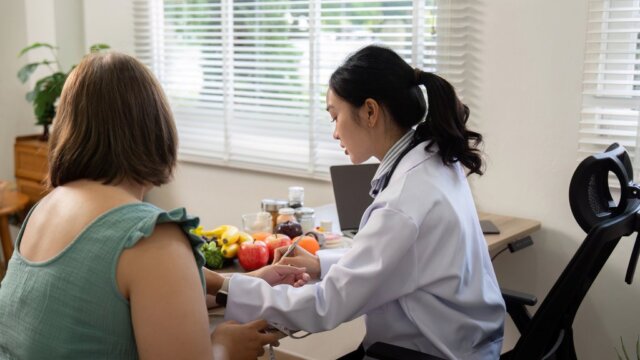
At Diet2Nourish, we have an effective and simple procedure to assist the patients:
- Evaluation: Our cancer nutritionist in Delhi examines your past and treatment history, and eating patterns.
- Personal Plan: You receive an individualised meal plan according to your body’s needs and preferences in tasting meals.
- Continuing Care: We modify your scheme as your health condition varies in the course and after treatment.
Get Your Personalized Diet Plan
Fill in your details and our expert will reach out to you
Who Should Seek Specialised Cancer Nutrition Support?
Not only those at the advanced stages need specialised nutrition. It will make you strong, recover quicker, and feel better at any given stage.
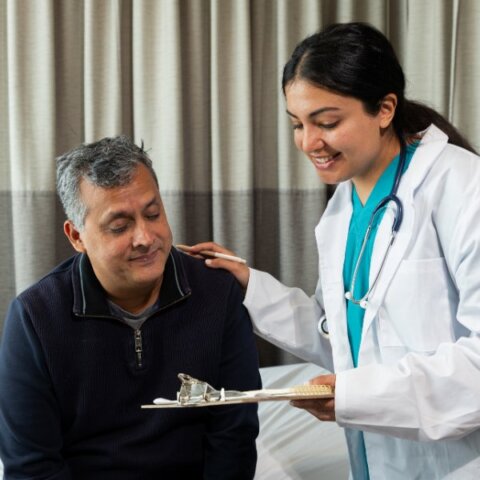
Newly Diagnosed Patients
Immediately after diagnosis, the next thing is preparing your body to receive treatment. Our nephrology dietician in Delhi can help you.
- Achieve strength through balanced meals designed safely even for those following a heart patient diet chart during treatment.
- Help themselves get a boost of immunity through fresh fruits, vegetables and healthy fats.
- Maintain a good body weight to enhance the outcome of treatment.
- A nutrition professional is able to develop a plan to ensure that your body is equipped to face what is coming ahead.
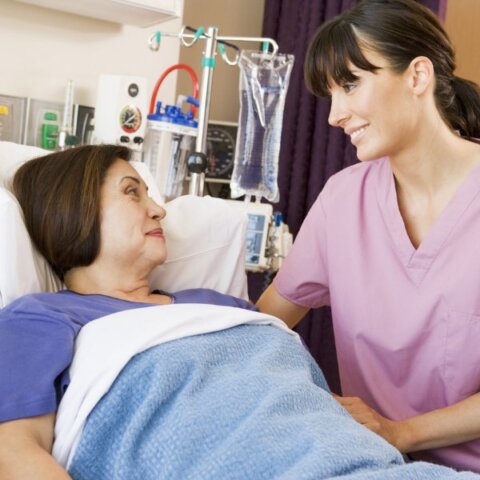
Patients Undergoing Treatment
Chewing food may be hard during chemotherapy, radiation, or even surgery. Our cancer nutrition expert in Delhi can help you.
- Select soft foods that are mouth and stomach-friendly.
- Take frequent small meals to cope with the nausea.
- Include protein snacks or controlled options from a low protein foods list for kidney disease when renal function is compromised.
- Take sufficient amounts of fluids to avoid dehydration.
- A food consultant will work towards having you identify foods that will benefit you without aggravating symptoms.

Post-Treatment & Recovery
The period of recovery should be used to restore your strength and safeguard your long-term health. Dt. Priyanka Jaiswal, a cancer nutritionist in Delhi, can help you.
- Repair cells by eating and drinking antioxidants,
- Include leaf proteins and lentils to recuperate the muscle.
- Choose unprocessed foods and avoid processed foods.
- Support a normal weight so as to minimise the chances of recurring cancer, even for those transitioning from a dialysis patient diet chart.
- A nutritional therapist will see that your diet takes care of prevention and healing.

Caregivers & Families
The families should be informed as well on how to treat their loved ones. Priyanka Jaiswal, a Food consultant, can help you.
- Get to know ways of preparing food that is easy to consume but enriching in nutrition.
- Learn what foods can alleviate the pain.
- Design menus that are able to serve both the health of the patient and the family.
- Emotional support includes good food that makes you comfortable and close.

Individuals Seeking Prevention
Among the most effective measures to reduce the risks of cancer, healthy eating is one of them. With 12+ years of experience, Priyanka Jaiswal can help you to
- Consume lots of colourful fruits and vegetables every day as part of a recovery-friendly iron diet chart.
- Prefer whole instead of refined grains.
- Restrict sugar drinks, alcohol and processed meat.
- Exercise and maintain a normal weight.
Frequently Asked Questions
We suggest that you include soft, smooth, bland items such as bananas, oatmeal, and boiled potatoes in your diet during chemotherapy. They are easy to digest. Additionally, focus on consuming small, frequent meals to help alleviate nausea. Our customised strategies can help you consume sufficient calories/protein to sustain strength.
Our Cancer Nutrition Support program in Delhi, by a cancer nutritionist in Delhi, is a comprehensive 3-step approach that includes a personalised dietary assessment, evidence-based nutrition planning, and continuous support tailored to each stage of cancer treatment. Whether you’re undergoing chemotherapy, radiation, or post-treatment recovery, our Delhi-based specialists ensure your nutritional needs are fully addressed.
Yes, diet can help in cancer recurrence in some cases. To reduce the chances of recurrence, it is good to have antioxidant meals and omega-3-rich food to increase the chances of minimising the occurrence of malignant cells. You can also reach out to us for a better meal plan according to your health condition.
Yes, you can take supplements when you are on cancer treatment, but it is good to advise your doctor. Your doctor can give better advice. If you want a customised diet plan, our best kidney dietician in Delhi is here for you. We can help you create an evidence-based meal plan that supports your supplement as well as treatment.
You can manage nausea and appetite loss with cold foods, ginger and peppermint as an anti-nausea diet. It is also good to have high-calorie mini-meals to fight appetite loss, changing textures/temperature to patient tolerance to squeeze the most nutrition in during challenging treatment periods.
Protein is important for recovery because it repairs tissues damaged by treatment. It also prevents muscle wasting (cachexia), strengthens immunity post-chemo/radiation and supports wound healing after surgery. We can help you to have high-protein diets in the right amount and the right way.
Other Diet Programs
Nutritionist for Weight Gain | Dietician for Weight Loss | Ketogenic Dietician | Best Online Weight Loss Program | Dietician for Diabetic Patients | Cardiac Nutritionist | Pcos Dietician | Kidney Dietician | Liver Dietician | Hypothyroidism Nutritionist | Menopause Dietician | Nutritionist for High Blood Pressure | Low Fodmap Dietician | Dietician for Digestive Issues | Vitamin B12 Deficiency Nutritionist | Plant Based Dietitian | Ayurvedic Dietician | Nutritionist for Breastfeeding | Nutritionist During Pregnancy | Dietitian for Gestational Diabetes | Nutritionist for Athletes | Sports Nutritionist | Nutritionist for Seniors








